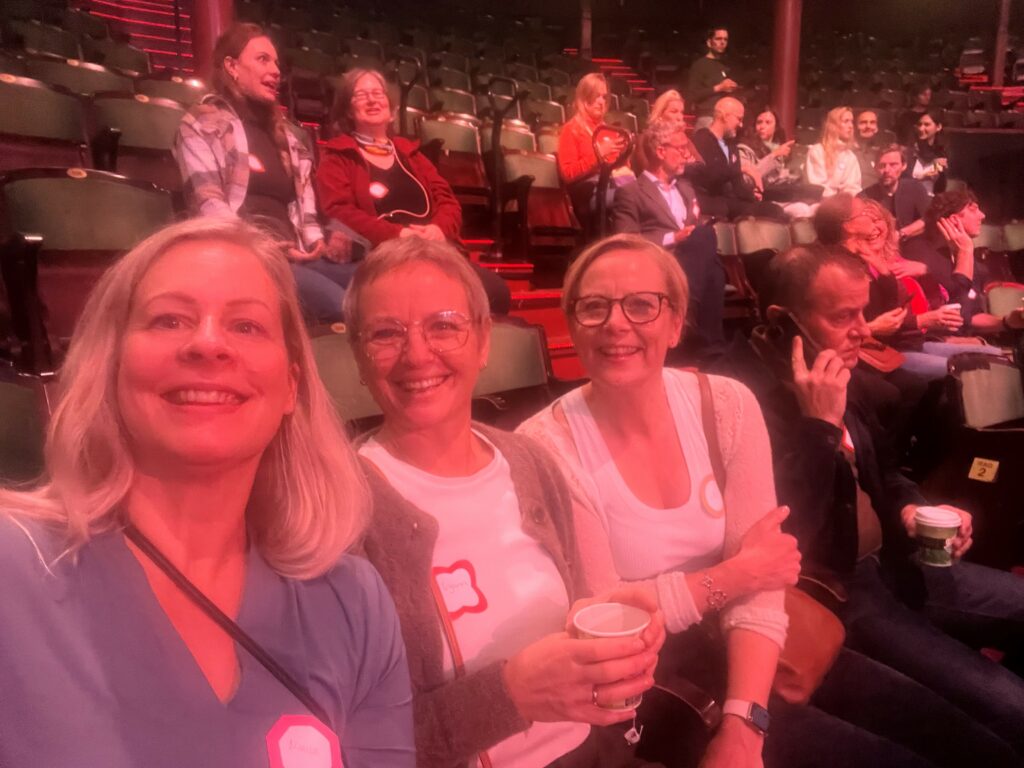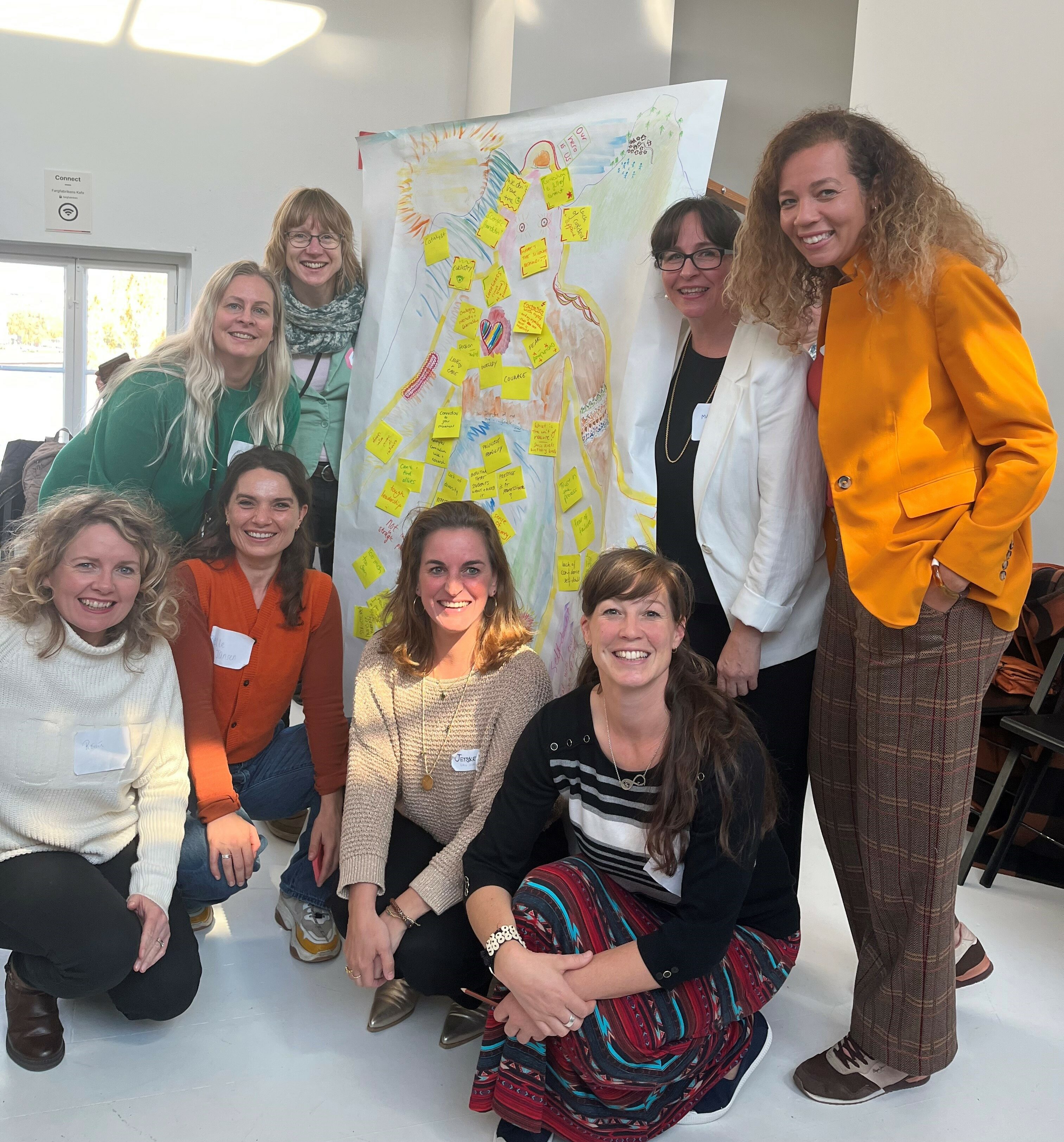I had the privilege of participating in the three-day Inner Development Goals (IDG) Summit, “The Space Between,” in Stockholm in October 2024. The IDG framework is being developed to transform leadership in a way that supports the achievement of the UN’s Sustainable Development Goals (SDGs) by 2030. IDG is a not-for-profit, open-source initiative that has grown through the collaboration of its founding organizations and a global network of communities. Today, the initiative includes over 600 hubs around the world and continues to expand rapidly.
 Photo: Me and my two coach colleagues (Inger Beate Botheim & Ingunn Vagstein) preparing for the first day at the venue Cirkus Stockholm. (Photo by Marika Nikkinen)
Photo: Me and my two coach colleagues (Inger Beate Botheim & Ingunn Vagstein) preparing for the first day at the venue Cirkus Stockholm. (Photo by Marika Nikkinen)
“Although we have accumulated much knowledge about the climate crisis, poverty, public health, and other social issues addressed in the SDGs, we often lack the inner capacity to navigate our increasingly complex world and its challenges.” This is how the IDG community highlights a critical gap: while external strategies are well-known, we often fail to address the inner capacities—such as emotional intelligence, self-awareness, and collaboration—that are necessary to effectively tackle these global challenges.
As a coach and leadership trainer, I have been closely following this work, and I find it incredibly useful for cultivating self-awareness and improving collaboration. The tools offered by the IDG framework can be applied in any context, and it only takes the courage to embark on a path of self- and organizational development. When we transform ourselves, we inspire transformation in others.
Key Take Aways from the Summit Speakers
“Developing from the inside is not the easy route”, remarked Katherine Moser, the event host, as she opened the summit. The theme of the event, “The Space Between,” emphasizes that transformation occurs in the space between chaos and clarity – you know, the grey mass. The lineup of speakers was interesting, each contributing their unique vision of leadership and the role of the IDG framework in shaping future leaders who can make a meaningful difference. Here, I will share a few key takeaways from the summit.
One of the speakers I enjoyed listening to the most was Tho Ha Vinh, a former Program Director for the Gross National Happiness Centre in Bhutan. His powerful message was: “Economic growth is a means, not the goal. Happiness and well-being are the true goals. Not just feeling great, but being great.” He emphasized three essential areas of harmony that must be cultivated for sustainable development:
- Harmony with the self: Learning to care for and understand oneself.
- Harmony with others and society: Building trust and developing emotional and social skills.
- Harmony with the planet: Fostering a deeper connection with the environment and sustainability.
He also spoke about the concept of Gross National Happiness, which emphasizes the importance of well-being over traditional economic indicators.
For me, one of the most touching moments of the event came during the speech from the Combatants for Peace representatives Chen Alon and Rava Salman, an Israeli-Palestinian NGO that has been nominated for the Nobel Peace Prize for their work in the Israeli-Palestinian conflict in 2017/2018. Their core message was simple yet powerful: we must treat each other as humans, not as occupiers or terrorists – lay down arms and instead extend a hand in peace. The heartfelt words and deep humanity conveyed by the speakers left no one untouched, and as we broke for the next session, there were few dry eyes in the room.
I also loved Paul Mbikayi’s message: “Sawubona! I see you and recognize your dignity and worth”—a Zulu greeting. He brought us a powerful message about the need to authentically connect with each other and listen to one another, no matter where we come from or who we are. We should invite everyone to the table and especially remember those who are not able to join. Mr. Mbikayi works as a Civil Servant to Humanity & the Government of the Netherlands
Throughout the days, we also had interesting panel discussions, and I was impressed that the White House and UN were present, discussing how they will adopt the IDG framework in their work. Between the panels and speakers, we were treated to beautiful poetry and music performances. I really loved how music, poetry, and the arts were part of the summit, and I would like to enjoy more of that in my everyday (work) life.
The Role of Higher Education in Supporting the IDG Framework
For one of the days, I participated in the education track, where we discussed how we can support our institutions, teams, and students in adopting the IDG framework. Our guiding questions for the day were: Why, What, and How? I was struck by the fact that educators across all levels—from early childhood education to universities—are integrating the IDG model into their curricula and teaching practices. The idea of nurturing inner development as part of education is gaining attention, and many educators are already using the IDG framework to shape their work and support their students’ growth. For us at Laurea, the work being done by a coalition of universities in the Netherlands is particularly interesting. They have developed a “Transition Makers Toolbox,” which is available for anyone to use.
 Proudly presenting our Higher Education Hero with our enthusiastic team representing higher education in Ireland, Sweden, Netherlands, Germany, South Africa and Finland. (Photo by bypassing participant)
Proudly presenting our Higher Education Hero with our enthusiastic team representing higher education in Ireland, Sweden, Netherlands, Germany, South Africa and Finland. (Photo by bypassing participant)
What became clear throughout the summit is that the IDG framework is not just a tool for individual development, but a pathway for transforming entire organizations, educational institutions, and communities. As we look to the future, it is clear, that higher education has a critical role to play in shaping the leaders of tomorrow. By embracing frameworks like the Inner Development Goals, we can create a new generation of leaders who not only understand the challenges of our time but also have the inner resilience and emotional intelligence to address them. In this way, higher education can help foster the kind of leadership that is essential for building a sustainable and equitable future for all.
So, what can we do in our everyday lives? I guess a lot, since the change starts within – and also in collaboration with others. My leadership teacher colleagues and I at Laurea are currently running a Future Leadership Skills project funded by Jotpa, where the goal is to create a 25-credit Future Leadership Program for 2025. We are working on planning the curriculum with our partner organizations and will integrate the IDG framework into it.
If you are interested in hearing more and/or discussing the IDG framework, don’t hesitate to contact me.
Interesting links